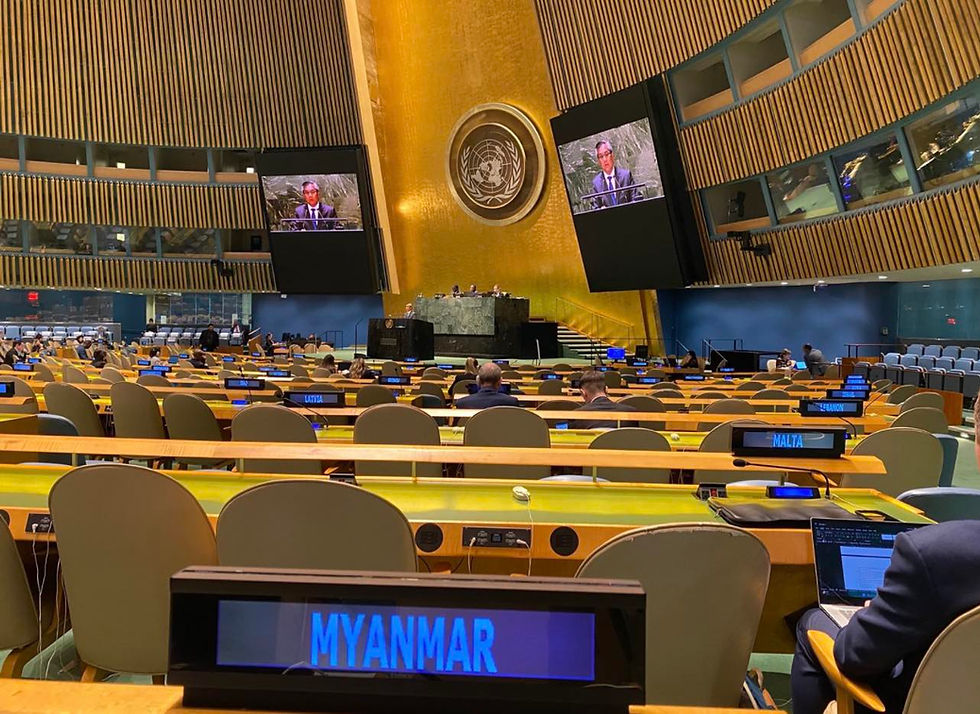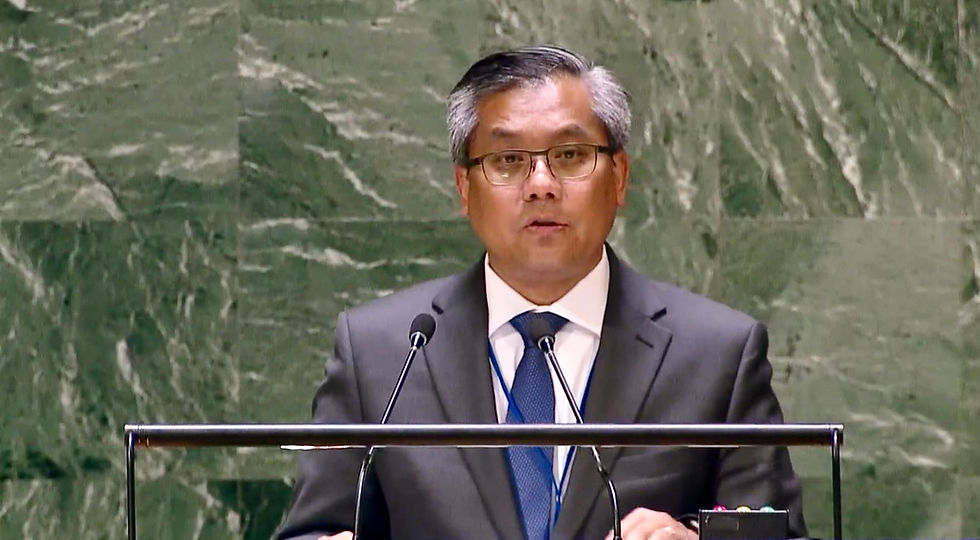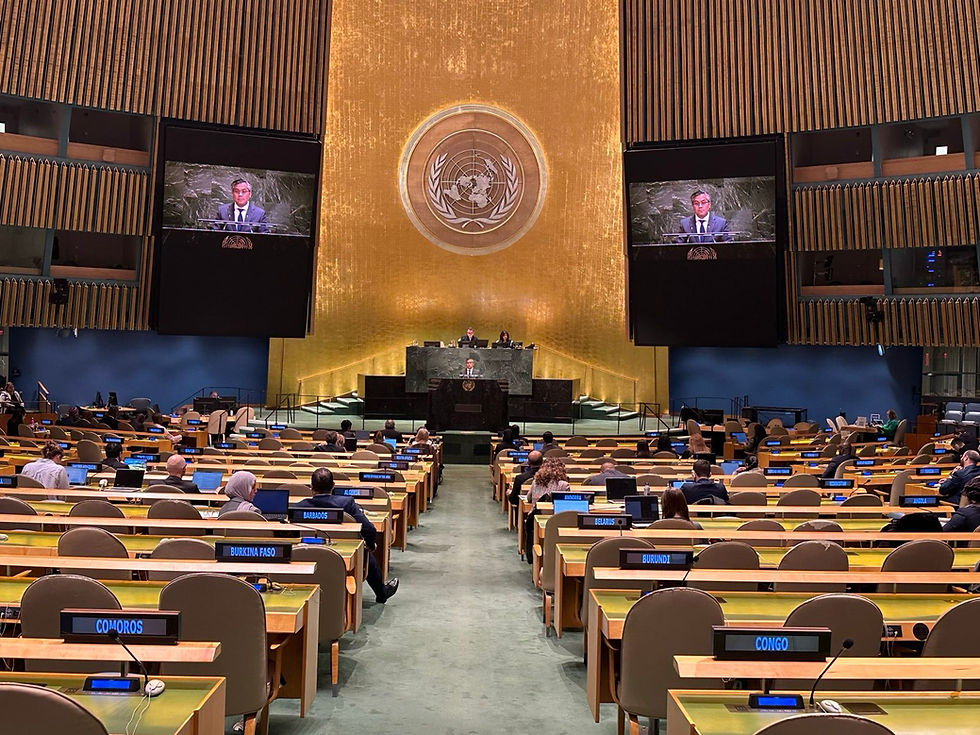Statement by Ambassador Kyaw Moe Tun at UNGA Plenary Meeting on Responsibility to Protect (R2P)
- Myanmar Mission To UN

- Jun 29, 2023
- 6 min read
Updated: Jul 1, 2023




Statement by Ambassador Kyaw Moe Tun, Permanent Representative of the Republic of the Union of Myanmar to the United Nations, at the United Nations General Assembly Plenary Meeting on the Responsibility to Protect (R2P) and the Prevention of Genocide, War Crimes, Ethnic Cleansing and Crimes Against Humanity, held on 30 June 2023
[Below Myanmar Text]
သတင်းအဖြစ်ထုတ်ပြန်ချက်
ကာကွယ်မှုပေးရန်တာဝန်ရှိမှု (Responsibility to Protect) နှင့် လူမျိုးသုဉ်းသတ်ဖြတ်မှု၊ စစ်ရာဇဝတ်မှု၊ လူမျိုးစုအလိုက် သုတ်သင်ရှင်းလင်းမှုနှင့် လူသားမျိုးနွယ်စုအပေါ် ကျူးလွန်သည့် ပြစ်မှုများ ကာကွယ်တားဆီးရေးဆိုင်ရာ ကုလသမဂ္ဂအထွေထွေညီလာခံ၊ မျက်နှာစုံညီအစည်းအဝေး၌ ကုလသမဂ္ဂဆိုင်ရာ မြန်မာအမြဲတမ်းကိုယ်စားလှယ် သံအမတ်ကြီး ဉီးကျော်မိုးထွန်း က မြန်မာနိုင်ငံ၏ အခြေအနေသည် တာဝန်ခံမှုနှင့် တရားမျှတမှုတို့နှင့်စပ်လျဉ်း၍ လက်ရှိ တစ်ကမ္ဘာလုံး ရင်ဆိုင်နေရသည့် စိန်ခေါ်မှုဖြစ်သည်ကို ဖော်ညွှန်းနေ၊ မိမိတို့အားလုံးအနေဖြင့် ဝိုင်းဝန်းအရေးယူဆောင်ရွက်ရမည့်ကိစ္စ ဖြစ်ကြောင်း ထောက်ပြခဲ့
(နယူးယောက်မြို့၊ ၂၀၂၃ ခုနှစ်၊ ဇွန်လ ၃၀ ရက်)
၁။ ကုလမသဂ္ဂဆိုင်ရာ မြန်မာအမြဲတမ်းကိုယ်စားလှယ် သံအမတ်ကြီး ဦးကျော်မိုးထွန်းသည် ဇွန်လ၊ (၂၆) ရက်နေ့ နှင့် (၃၀) ရက်နေ့ တို့တွင် ကုလသမဂ္ဂအထွေထွေညီလာခံ၌ ကျင်းပပြုလုပ်သည့် ကာကွယ်မှုပေးရန် တာဝန်ရှိမှု (Responsibility to Protect) နှင့် လူမျိုးသုဉ်းသတ်ဖြတ်မှု၊ စစ်ရာဇဝတ်မှု၊ လူမျိုးစုအလိုက် သုတ်သင်ရှင်းလင်းမှုနှင့် လူသားမျိုးနွယ်စုအပေါ် ကျူးလွန်သည့် ပြစ်မှုများကာကွယ် တားဆီးရေးဆိုင်ရာ မျက်နှာစုံညီအစည်းအဝေးသို့ တက်ရောက်ခဲ့ပြီး၊ (၃၀-၆-၂၀၂၃) ရက်နေ့တွင် ပြုလုပ်သည့် အစည်းအဝေးတွင် မြန်မာအမြဲတမ်းကိုယ်စားလှယ်က မိန့်ခွန်းပြောကြားရာတွင် မြန်မာနိုင်ငံ၏ အခြေအနေသည် တာဝန်ခံမှုနှင့် တရားမျှတမှုတို့နှင့် စပ်လျဉ်း၍ လက်ရှိတကမ္ဘာလုံး ရင်ဆိုင်နေရသည့် စိန်ခေါ်မှုဖြစ်သည့်အတွက် အရေးယူဆောင်ရွက်မှုပြုရန် တိုက်တွန်းခဲ့ပါသည်။
၂။ မြန်မာအမြဲတမ်းကိုယ်စားလှယ်၏ မိန့်ခွန်းတွင် အောက်ပါအဓိကအချက်များ ပါဝင်ပါသည် -
(က) ဤအစည်းအဝေးသည် လူမျိုးသုဉ်းသတ်ဖြတ်မှု၊ စစ်ရာဇဝတ်မှု၊ လူမျိုးစုအလိုက် သုတ်သင် ရှင်းလင်းမှုနှင့် လူသားမျိုးနွယ်စုအပေါ် ကျူးလွန်သည့် ပြစ်မှုများမှ ပြည်သူများအား ကာကွယ်ရန် နိုင်ငံများ၌ အဓိကတာဝန်ရှိမှုကို ထပ်လောင်းအတည်ပြုခြင်း ဖြစ်ကြောင်း၊ သို့ရာတွင် နိုင်ငံများက ယင်းတာဝန်အပေါ် စောင့်ထိန်းလိုက်နာမှုရှိရန် အဓိကတာဝန်ရှိသော်လည်း၊ အာဏာရယူထားသည့် အာဏာပိုင်တစ်ရပ်မှ ၎င်း၏ ပြည်သူများအပေါ် အဆိုပါဆိုးဝါးပြင်းထန်သည့် ပြစ်မှုများ ကျူးလွန်ပါက နိုင်ငံတကာအသိုက်အဝန်း အနေနှင့် အချိန်မီ ပြတ်ပြတ်သားသား အရေးယူဆောင်ရွက်ရမည့် တာဝန်ရှိကြောင်း၊
(ခ) နိုင်ငံတကာအသိုက်အဝန်း၏ အရေးယူဆောင်ရွက်ရန် ပျက်ကွက်မှုသည် လက်တွေ့ဒုက္ခ ခံစားရသူများအပေါ်၌သာမက နိုင်ငံတကာဥပဒေများ၏ အခြေခံအုတ်မြစ်များအပေါ်၌ပါ ပြင်းထန်စွာ အကျိုးသက်ရောက်မှုရှိကြောင်း၊
(ဂ) ကာကွယ်ပေးမှုသည် ယင်းဆိုးဝါးသည့် ပြစ်မှုများ၏ လက်ငင်းအကျိုးသက်ရောက်မှုကို တုံ့ပြန်ခြင်း သက်သက်မဟုတ်ကြောင်း၊ ဖွဲ့စည်းပုံစနစ်ဆိုင်ရာ အန္တရာယ်ရှိမှုအခြေအနေများကိုပါ ထည့်သွင်းဖြေရှင်းရေး သည် အဓိကကျကြောင်း၊ ယင်းသို့ဆောင်ရွက်ရန် ကမ္ဘာလုံးဆိုင်ရာ လမ်းပြမြေပုံဖြစ်သည့် ၂၀၃၀ ပြည့်နှစ် အစီအစဉ် ချမှတ်ထားသော်လည်း စံချိန်စံနှုန်းအများစု အချိန်မီပြည့်မှီနိုင်မှု မရှိခြင်းအပေါ် စိုးရိမ်ဖွယ် တွေ့မြင်နေရကြောင်း၊ မြန်မာနိုင်ငံအပါအဝင် အခြေအနေအများစုသည် ဆင်းရဲနွမ်းပါးမှုလျှော့ချရေး အပါအဝင် ခက်ခက်ခဲခဲ ဆောင်ရွက်ရရှိထားသည့် ရေရှည်ဖွံ့ဖြိုးတိုးတက်ရေးဆိုင်ရာ ရည်မှန်းချက်များ အကောင်အထည်ဖော်မှု၌ ပြန်လည်ဆုတ်ယုတ်မှုများ ရှိနေကြောင်း၊
(ဃ) မြန်မာနိုင်ငံ၌ တရားမဝင်အာဏသိမ်းစစ်တပ်၏ ဆိုးဝါးပြင်းထန်သည့် ပြစ်မှုများ ကြိမ်ဖန်များစွာ ကျူးလွန်မှုကို မြန်မာပြည်သူများက ခံစားနေရလျက်ရှိကြောင်း၊ ဆိုးဝါးပြင်းထန်သည့် ပြစ်မှုများ ဖြစ်ပေါ်စေနိုင်သည့် ဖွဲ့စည်းပုံဆိုင်ရာ အန္တရာယ်ရှိမှုကို တားဆီးရာ၌ ငြိမ်းချမ်း၍ အားလုံးပါဝင်သော လူမှုအသိုက်အဝန်း ဖြစ်ပေါ်ရေး၊ အားလုံးအတွက် တရားမျှတမှုရှိရေး၊ တရားဥပဒေစိုးမိုးမှု ခိုင်မာစေရေးနှင့် အဆင့်တိုင်း၌ ထိရောက်၍ တာဝန်ခံမှုရှိသည့် အဖွဲ့အစည်းများ တည်ဆာက်ရေးတို့ ပါဝင်သည့် ရေရှည်တိုးတက်မှုဆိုင်ရာ ရည်မှန်းချက် (၁၆) သည် အဓိကအုတ်မြစ်ဖြစ်ကြောင်း၊ သို့ရာတွင် မြန်မာနိုင်ငံ၏ ယင်းအခြေခံအုတ်မြစ်ကို တရားမဝင် စစ်တပ်အာဏာသိမ်းမှုနောက်ပိုင်း မြန်မာစစ်တပ်မှ လုံးဝဖျက်ဆီး ပစ်လိုက်ကြောင်း၊
(င) ယခုအခါ စစ်တပ်သည် ပြစ်ဒဏ်ကျသင့်မခံရမှု အစဉ်အလာကို ထိန်းသိမ်းဖန်တီးလျက်ရှိပြီး၊ စစ်တပ်အာဏာသိမ်းမှုအပေါ် ခိုင်မာစွာ ဆန့်ကျင်လျက်ရှိသည့် တိုးပွားလာသည့် ခုခံရေးတပ်ဖွဲ့များအား ကူညီစာနာသူဟု ၎င်းတို့မှ မှတ်ယူသည့်အားလုံးကို လူမဆန်စွာ အကြမ်းဖက်တိုက်ခိုက်မှု ပြုလျက်ရှိကြောင်း၊ နိုင်ငံတစ်ဝန်း ၎င်းတို့အား ခုခံမှုများကို ထိန်းချုပ်နိုင်ခြင်းမရှိသည့်အတွက် အရပ်သားပြည်သူများကို သတ်ဖြတ်မှုကို စစ်ရေးဗျူဟာအဖြစ် အသုံးပြုနေကြောင်း၊ စစ်တပ်မှ ပြည်သူ (၃၇၀၀) ကျော် သတ်ဖြတ်ခဲ့ကြောင်း၊
(စ) စစ်တပ်၏ ရက်စက်သည့် လုပ်ရပ်များတွင် ထင်ရာ မြင်ရာ ဖမ်းဆီးမှု၊ ဖမ်းဆီးခံရသူများအား နှိပ်စက်မှု၊ ပြည်သူအိုးအိမ်များအား မီးရှို့မှု၊ ပြည်သူများအား ပစ်မှတ်ထား ဗုန်းကြဲ၍ အစုလိုက် အပြုံလိုက် သေစေမှုတို့ ပါဝင်ကြောင်း၊ ဤအချက်များကို ကုလသမဂ္ဂက မှတ်တမ်းမှတ်ရာ ကျယ်ကျယ်ပြန့်ပြန့်ထားရှိ ထားကြောင်း၊ မြန်မာနိုင်ငံဆိုင်ရာ ကုလသမဂ္ဂ လွတ်လပ်သော စုံစမ်းစစ်ဆေးရေးယန္တရားမှ စစ်တပ်၏ လုပ်ရပ်များသည် လူသားမျိုးနွယ်စုအပေါ် ကျူးလွန်သည့် ပြစ်မှု၊ စစ်ရာဇဝတ်မှု မြောက်သည်ဟု ကောက်ချက်ချထားကြောင်း၊ ယင်းသည် ကာကွယ်ပေးရန် တာဝန်ရှိမှု (R2P) အား ကိုးကားရန် ရည်ရွယ်သည့် ပြစ်မှု(၄)ခုတွင် ပါဝင်သည့် ပြစ်မှုများဖြစ်ကြောင်း၊
(ဆ) မြန်မာပြည်သူများသည် လူသားမဆန်သည့် စစ်တပ်အုပ်ချုပ်မှုကို အဆုံးသတ်၍ တိုင်းရင်းသား အားလုံး၏ ကိုယ်ပိုင်ဆုံးဖြတ်ပိုင်ခွင့်ကို အာမခံသည့် ဖက်ဒရယ်အုပ်ချုပ်မှုအောက်တွင် တရားဥပဒေ စိုးမိုးရေးနှင့် ဒီမိုကရေစီစနစ် ပြန်လည်ထူထောင်၍ လူ့အခွင့်အရေးကို လေးစားသည့် နိုင်ငံကို ပြန်လည်တည်ဆောက်ရန် ဆုံးဖြတ်ထားကြောင်း၊ ရေရှည်ဖွံ့ဖြိုးတိုးတက်သည့် ရည်မှန်းချက်များ မြန်မာနိုင်ငံ၌ အကောင်အထည်ဖော်ရေးသည် ပြည်သူများ၏ အဆိုပါအခြေခံအုတ်မြစ်များ ပြန်လည် တည်ဆောက်နိုင်မှုအပေါ်၌ များစွာမူတည်ကြောင်း၊ ယင်းသို့ဆောင်ရွက်ရန် ကုလသမဂ္ဂအဖွဲ့ဝင်နိုင်ငံများ၏ အားပေးကူညီမှုကို လိုအပ်ကြောင်း၊
(ဇ) သို့ရာတွင် နိုင်ငံတကာအသိုက်အဝန်း၏ လုံလောက်မှုမရှိသည့် အရေးယူမှုဖြင့် စစ်တပ်သည် ဆိုးဝါးသည့် နိုင်ငံတကာပြစ်မှုများကို ပြစ်ဒဏ်ကျသင့်ခံရခြင်း မရှိဘဲ ဆက်လက်ကျူးလွန်နေကြောင်း၊ ကုလသမဂ္ဂ လုံခြုံရေးကောင်စီ ဆုံးဖြတ်ချက် အဆို (၂၆၆၉) ချမှတ်ပြီးနောက်ပိုင်း ပြီးခဲ့သည့် (၆) လတာ ကာလအတွင်း စစ်တပ်သည် ၎င်း၏ တိုက်ခိုက်အကြမ်းဖက်မှုများကို အရှိန်မြှင့်တင်ခဲ့ကြောင်း၊ ယင်းဆုံးဖြတ်ချက်အဆို၏ နောက်ဆက်တွဲအရေးယူမှုကို ကုလသမဂ္ဂလုံခြုံရေးကောင်စီမှ ချမှတ်ရန် လိုအပ်နေကြောင်း၊
(ဈ) စစ်တပ်အုပ်ချုပ်မှုအောက်တွင် အဆက်မပြတ် အကြမ်းဖက်မှုဒဏ်ကို ခံစားနေရသည့် မြန်မာပြည်သူများကို နိုင်ငံတကာအသိုက်အဝန်းအနေနှင့် ကာကွယ်မှု မပေးနိုင်သည့်တိုင်၊ ကုလသမဂ္ဂ အဖွဲ့ဝင်နိုင်ငံများအနေနှင့် အနည်းဆုံး ဆောင်ရွက်ပေးနိုင်သည်မှာ စစ်တပ်မှ မြန်မာပြည်သူများအပေါ် ရက်စက်သည့် အကြမ်းဖက်လုပ်ရပ်များ ဆက်လက်ကျူးလွန်နိုင်ခြင်းကို အားမပေးခြင်းဖြင့် ဆောင်ရွက်ပေးနိုင်ကြောင်း၊
(ည) မြန်မာပြည်သူများကိုယ်စား အဖွဲ့ဝင်နိုင်ငံများအား အောက်ပါအချက် (၄)ချက်ကို တောင်းဆို လိုကြောင်း -
(၁) လူသားမဆန်သည့် စစ်တပ်ကို စစ်ရာဇဝတ်မှုနှင့် လူသားမျိုးစုနွယ်စုအပေါ် ကျူးလွန်သည့် ပြစ်မှုများ ပြည်သူများအပေါ် ဆက်လက်ကျူးလွန်ရန် အသုံးပြုသည့် လက်နက်နှင့် နည်းပညာများ ထောက်ပံ့ခြင်း မပြုရန်၊ ဤသည်မှာ ကုလသမဂ္ဂအထွေထွေညီလာခံ ဆုံးဖြတ်ချက် အဆို ၇၅/၂၈၇ နှင့်အညီ ဖြစ်ကြောင်း၊
(၂) ပြည်သူများအပေါ် အကြမ်းဖက်မှုများ ကျူးလွန် ခြိမ်းခြောက်မှုပြုနေသည့် စစ်တပ်အား ငွေကြေး ကူညီထောက်ပံ့မှုမပြုရန်၊
(၃) တရားမဝင် အာဏာသိမ်းရန် ကြိုးပမ်းမှုကို အသိအမှတ် မပြုရန်၊
(၄) စစ်တပ်၏ ပြစ်ဒဏ်ကျမှုမှ ကင်းလွတ်နေမှုကို အဆုံးသတ်၍ ပြစ်မှုကျူးလွန်သူများ ပြစ်ဒဏ် ကျသင့်ခံရေး ကူညီဆောင်ရွက်ပေးရန်၊
(ဋ) မြန်မာနိုင်ငံ၏ အခြေအနေသည် တာဝန်ခံမှုနှင့် တရားမျှတမှုတို့နှင့်စပ်လျဉ်း၍ လက်ရှိ တစ်ကမ္ဘာလုံး ရင်ဆိုင်နေရသည့် စိန်ခေါ်မှုဖြစ်သည်ကို ဖော်ညွှန်းနေပြီး၊ မိမိတို့အားလုံးအနေဖြင့် ဝိုင်းဝန်းအရေးယူ ဆောင်ရွက်ရမည့်ကိစ္စပင် ဖြစ်ပါကြောင်း။
၃။ မြန်မာအမြဲတမ်းကိုယ်စားလှယ် ပြောကြားခဲ့သည့် မိန့်ခွန်းအပြည့်အစုံ (အင်္ဂလိပ်ဘာသာ) အား ပူးတွဲ ဖော်ပြအပ်ပါသည်။
၂၀၂၃ ခုနှစ်၊ ဇွန်လ ၃၀ ရက်
ကုလသမဂ္ဂဆိုင်ရာ မြန်မာအမြဲတမ်းကိုယ်စားလှယ်အဖွဲ့ရုံး၊ နယူးယောက်မြို့
Please check against delivery
Statement by Ambassador Kyaw Moe Tun,
Permanent Representative of Myanmar to the United Nations
at the United Nations General Assembly Plenary Meeting on the Responsibility to Protect (R2P) and the Prevention of Genocide, War Crimes, Ethnic Cleansing and Crimes Against Humanity
(New York, 30 June 2023)
Mr. President,
Today’s debate is a great opportunity for all member states to reflect on the concept of Responsibility to Protect affirmed at the World Summit 18 years ago. I appreciate the Secretary-General for his examination of the relationship between R2P and sustainable development in this year’s report entitled “Development and the Responsibility to Protect: Recognizing and Addressing Embedded Risks and Drivers of Atrocity Crimes”.
Mr. President,
We reaffirm that states have the primary responsibility to protect their populations from genocide, war crimes, ethnic cleansing and crimes against humanity. Nonetheless, the international community has responsibility to help states fulfill this obligation and take collective action in a timely and decisive manner especially when an authority of power itself is perpetrating those crimes against its own people. Consequences of failing to respond decisively to atrocity crimes are severe, not only for the immediate victims but also for the very foundations of international laws.
Protection is not just about responding to imminent risks of such serious crimes. Addressing the structural risks for mass atrocities is also the key tenet of protection responsibility of states. To do that, we have a global roadmap in the 2030 agenda. Unfortunately, we note with alarm that most of SDG targets are off track now. In many situations including my own country, hard-won gains in the SDG implementation including poverty reduction are in regression.
Mr. President,
As you all are aware, the people of Myanmar have been subject to repeated atrocious crimes being committed by the illegal military junta. Here I wish to highlight governance-related drivers of atrocities in the context of what is happening in Myanmar. Sustainable Development Goal 16 is a key foundation to prevent the structural risks that could lead to atrocities.
The goal encompasses promoting peaceful and inclusive societies, providing access to justice for all, strengthening the rule of law and building effective and accountable institutions at all levels. However, in Myanmar, this foundational goal is being totally demolished by the military junta since the illegal coup. The elected civilian government’s efforts to build effective, transparent, accountable and inclusive institutions have been eliminated by the unaccountable junta. With this, the junta has created and maintained a culture of impunity within the rank and file that encourages inhumane use of violence against anyone they deem to be sympathetic to the growing anti-coup resistance forces.
Under that perceived sense of impunity, the military has been relentlessly waging a campaign of violence even campaign of terror against the people of Myanmar in order to exert control over the population, which they will never have. Since they are unable to contain the nationwide resistance, the illegal junta has been turning to targeted killings of civilians as the military tactic. The junta forces have brutally killed over 3700 people.
The United Nations have extensively documented the junta’s brutal conducts including arbitrary arrests, torture of detainees, whole-sale burning of residential homes, indiscriminate aerial attacks and bombing and targeting killings of civilians in several massacres. The military’s brutal attacks against civilians are not isolated incidents. These attacks are so widespread, systematic and coordinated that the UN Independent Investigative Mechanism for Myanmar (IIMM) concluded that they amount to crimes against humanity and war crimes. These are among the four atrocity crimes the responsibility to protect was intended to invoke for.
Mr. President,
Myanmar people are determined to end the inhumane junta and rebuild their country by reestablishing the rule of law, democracy and respect for human rights under the federal governance system that guarantees self-determination for the ethnic peoples. Implementation of sustainable development goals in Myanmar largely depends on the ability of Myanmar people to establish these crucial foundations. To do that, we need support and help from the UN member states.
Myanmar is in a situation where the military institution, which is supposed to protect its own people, has been attacking the people who refuse to submit to their illegal and illegitimate rule. In the face of the relentless assaults by the brutal military machine, the people of Myanmar have long been asking the international community particularly the UN Security Council to take decisive action against the junta’s ongoing violence.
Unfortunately, with no adequate action from the international community, the military junta has been emboldened to continue further serious international crimes with total impunity. Over the past six months, the military has escalated its brutal attacks, meant to instill terror and intimidation. We all are witnessing of the military’s escalating brutality and attacks following the adoption of UNSC resolution 2669. Clearly, the UN Security Council needs to adopt effective follow-up measures to the resolution.
Therefore, I wish to appeal to the UN Security Council, individual member states and our neighbouring countries to protect the civilians in Myanmar by utilizing available tools suggested by the Secretary-General in his annual reports on R2P. While the international community is not providing protection to Myanmar people who are under relentless violent assaults from the illegitimate junta, the very least UN Member states can do is NOT to enable Myanmar military to commit further atrocity crimes against the people of Myanmar.
On behalf of the people of Myanmar, I urge all member states:
NOT to equip the inhumane military with the weapons and technologies they can use to commit further war crimes and crimes against humanity against the people of Myanmar. This is also in line with this Assembly’s call in its resolution 75/287;
Do not help fund the military’s brutal campaign of terror against Myanmar people;
Do not encourage the military junta by legitimizing their illegal attempted coup;
Finally, but most importantly, help us end the military impunity in Myanmar by holding perpetrators of serious international crimes accountable.
The situation in Myanmar is a stark reminder of the challenges we face in ensuring accountability and justice in the world. It is a call to action for all of us.
I thank you.
**********











